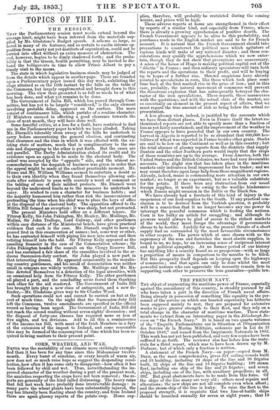CORN, WEATHER, AND WAR.
NEVER was the mutability of our climate more strikingly exempli- fied than it has been for any time since this Midsummer twelve- month. Every burst of sunshine, or every breath of warm air, now does not so much raise hope as suggest the desponding recol- lection, how often it has come only to disappoint—how often it has been followed by chill and wet. Thus, notwithstanding the im- proved character of the weather during a part of the present week, the anxieties respecting the crops have not been removed ; the re- ports are generally of the kind called distressing. The heavy rains that fell last week have probably done irretrievable damage : in many parts the wheat plants have been substantially injured, the hay has literally been floating about the country, and from Ireland there are again gloomy reports of the potato crop. Home sup- plies, therefore, will probably be restricted during the coming winter, and prices will be high.
These adverse reports at home are strengthened in their effect by reports of a similar kind, and especially from France, where there is already a growing apprehension of positive dearth. The French Government appears to be alive to this probability, and purchases made in the English market are said to be for French account. It is natural that the French Government should take precautions to counteract the political uses which agitators of various kinds will make of any national disaster ; and these con- siderations may qualify the apprehensions which we now enter- tain, though they do not show that precautions are unnecessary. A scion of the house of Hugo is making political capital out of the " di.sette " in France ; and then ordinary speculators will turkboth the reports and the operations to their profit, and will be buying up in hopes of a further rise. Shrewd suspicions have already pointed to speculations in corn, like those which took place some time back at the first marked rise in the price of iron ; and in this case, probably, the natural movement of commerce will prevent the disastrous explosion that has subsequently betrayed the cha- racter of the iron speculations. These reports, these manoeuvres with the quotations, and with the actual state of the market, are SO essentially an element in the present aspect of affairs, that we must regard the true amount of risk as being below the actual re- presentation. A less gloomy view, indeed, is justified by the accounts which we have from distant places. Even in France itself the latest au- thenticated reports are not able to specify more than a fraction of loss as yet fairly ascertained; and the improvement of the weather in France appears to have preceded that in our own country. The harvest in Algeria is reported to be so abundant that 800,000 hec- tolitres of wheat was expected in France besides other grain. Stocks are said to be low on the Continent as well as in this country ; but the total absence of gloomy reports from the districts that supply Dantzic and the other Northern ports would imply that the crops of those countries are up to the average. From America, both the -United States and the British Colonies, we have had very favourable accounts. The slight rise that has taken place in the maritime markets only indicates a local improvement for the trader; and we may count therefore upon large help from those magnificent regions. Already, indeed, maize is commanding more attention in our own market; no longer as an experiment, but as a valuable substitute for the potato. If there were any obstruction from our usual foreign supplies, it would be owing to the warlike hinderances which Russia might occasion in the Baltic or the Black Sea.
We have already had a foretaste of this kind of injury in the suspension of our food-supplies to the South. If any practical con- clusion is to be derived from the Turkish question, it probably will be a conviction that it no longer becomes any one power to interrupt the peaceful commerce which is feeding the nations. Corn is too bulky an article for smuggling ; and although its growers would always be glad of access to the richest markets of the world, they must forego the advantage if governments choose to be hostile. Luckily for us, the present threats of a short supply find us surrounded by the most favourable circumstances in other respects. The power which at once shares with us the supremacy of the seas and furnishes the most elastic supplies, is bound to us, we hope, by an increasing sense of reciprocal interest and by political sympathy. At no former period of our history has anything like a scarcity found us so prosperous—with so large a proportion of means in comparison to the mouths to be filled. But this prosperity itself depends on keeping open the highways of commerce ; and that again can only be done whilst the most powerful nations who can appreciate the necessity remain firm in supporting each other to preserve the true guarantee—public law.


































 Previous page
Previous page